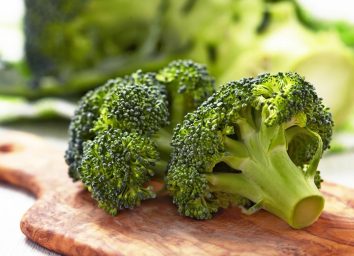13 Foods Scientifically Proven To Lower Cholesterol
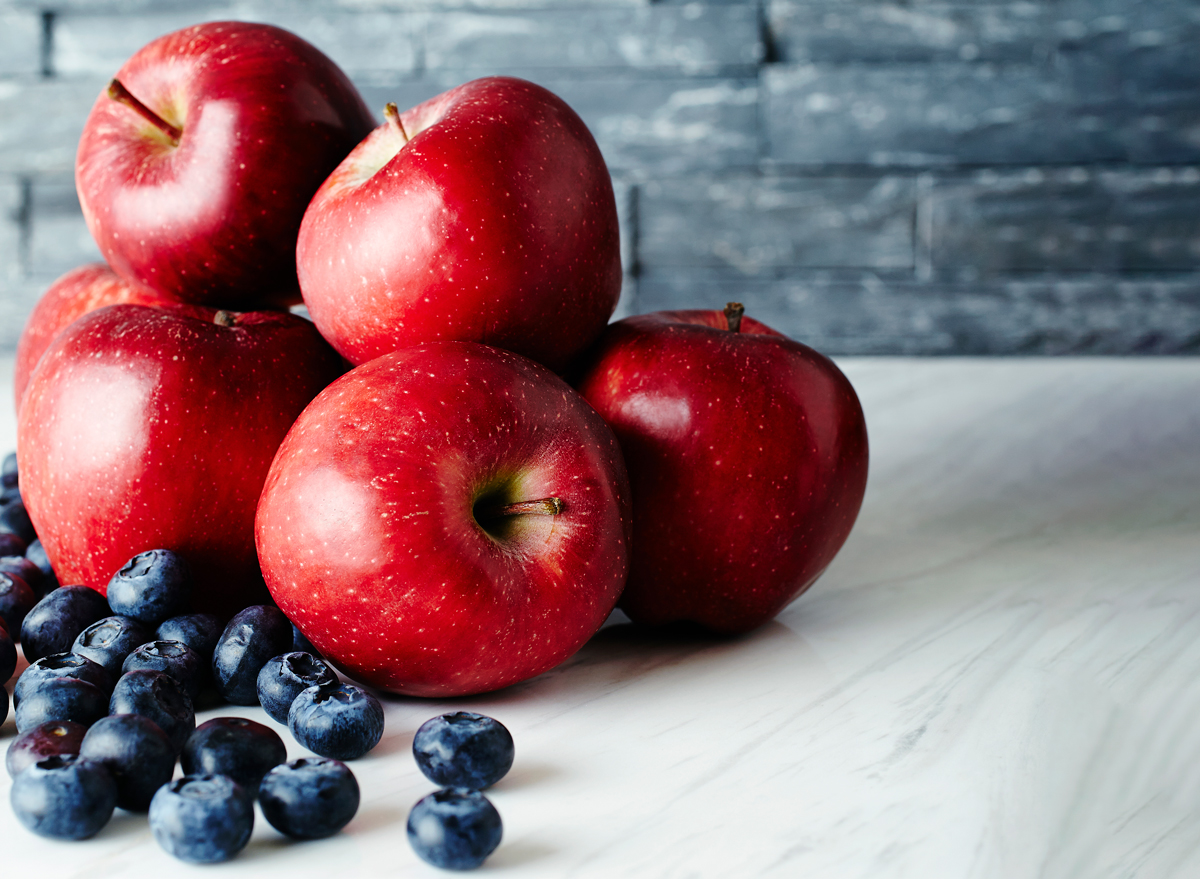
Elevated cholesterol levels are a common concern for many, given their significant impact on heart health and increased risk of cardiovascular disease. And with over 80 million people in America having high cholesterol, it is no wonder why so many people are seeking out natural ways to reduce their levels, including knowing which foods lower cholesterol.
While many factors can impact cholesterol levels, with some being completely out of our control (like our genetics), our diet can have a profound impact on our cholesterol levels. Incorporating heart-healthy foods into your daily meals can play a pivotal role in lowering bad cholesterol (LDL) and raising good cholesterol (HDL), thus promoting overall heart health and reducing the risk of heart disease.
In this context, there are certain foods renowned for their cholesterol-lowering properties. These range from nutrient-rich fruits and vegetables to whole grains, lean proteins, and healthy fats.
This article will introduce you to 13 foods that are not only delicious and versatile but also shown to help manage cholesterol levels naturally. Along with including physical activity in your habits and taking any medication recommended by your doctor, incorporating these foods into your diet may be a crucial step toward achieving healthy cholesterol levels.
Pulses
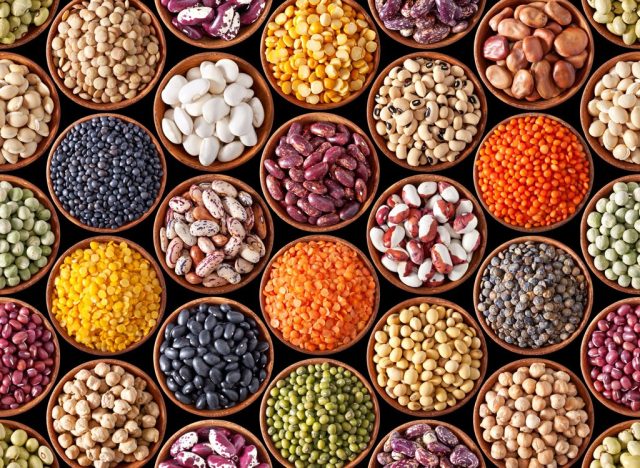
Pulses, which include foods like lentils and chickpeas, are not only versatile and nutritious components of a healthy diet but also play a significant role in managing and supporting healthy cholesterol levels. Among many other reasons why pulses support healthy cholesterol, one main feature is their soluble fiber content. Soluble fiber plays a crucial role in cholesterol management by binding with cholesterol particles in the digestive system and removing them from the body before they can circulate in the blood.
Data published in Nutrients showed that swapping just 1 ounce of common protein foods (including meat, poultry, eggs, seafood, and soy products) with ¼ cup of pulses can lead to a decrease in cholesterol by more than 10%. Results also found that consuming ½ cup of pulses provides 10% more fiber, magnesium, copper, and potassium compared to 1 ounce of refined grains, such as white rice.
Leading health organizations, including the American Heart Association, advocate for incorporating more plant-based proteins( like pulses) to reduce the risk of heart disease, high blood pressure, and high cholesterol.
Mushrooms
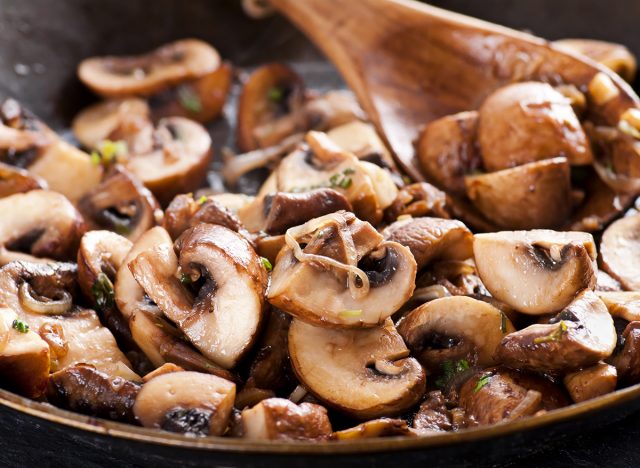
Mushrooms, particularly known for their unique flavors and nutritional value, also play a significant role in managing cholesterol levels. They contain a blend of powerful compounds such as beta-glucans and chitin which contribute to lowering bad cholesterol (LDL) while potentially raising good cholesterol (HDL).
According to a meta-analysis published in the American Journal of Medicine, after evaluating seven prospective studies, results showed that eating mushrooms may have favorable effects on both HDL and LDL cholesterol levels.
Just like many of us celebrate Taco Tuesday, try celebrating Mushroom Monday can help you include more mushrooms in your diet every single week.
Macadamia nuts
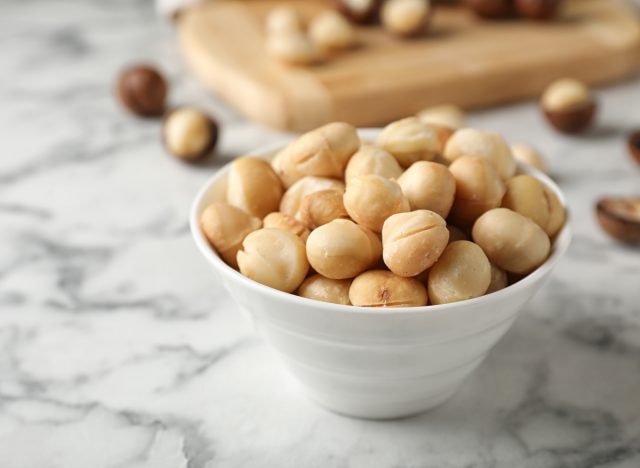
Macadamia nuts are recognized for their rich, buttery taste as well as for their role in promoting heart health. These nuts are packed with monounsaturated fats, similar to those found in olive oil, which are known for their cholesterol-lowering effects. They are also a good source of antioxidants, dietary fiber, and phytosterols, all of which contribute to overall heart health.
According to a randomized trial published in the Journal of Nutritional Science, daily consumption of macadamia nuts not only doesn't lead to weight gain, but it also appears to have cholesterol-lowering effects.
Prunes
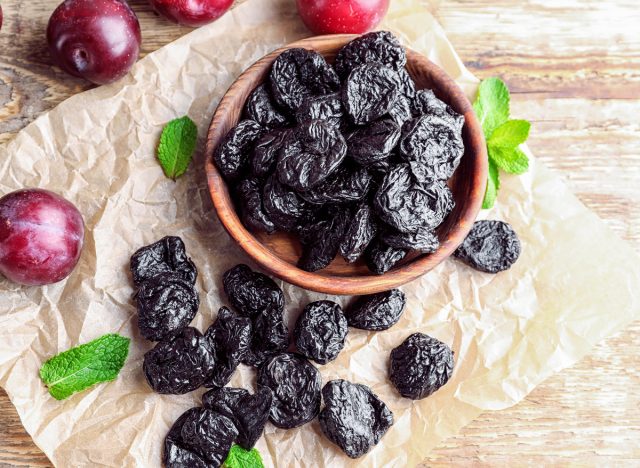
Prunes are so much more than a remedy to help you go "number two." They are a source of fiber and many nutrients that may support heart health.
There is some research to link regular prune consumption to improvements in cholesterol levels among older adults. Specifically, in men over age 55, prune consumption has been linked to improved HDL levels and improved total cholesterol to HDL ratio. Among post-menopausal women, eating four to six prunes daily has been linked to improved HDL levels and decreased inflammatory markers (TNF-a). Prunes also contain soluble fiber, which has independently been shown to improve cholesterol.
Oats
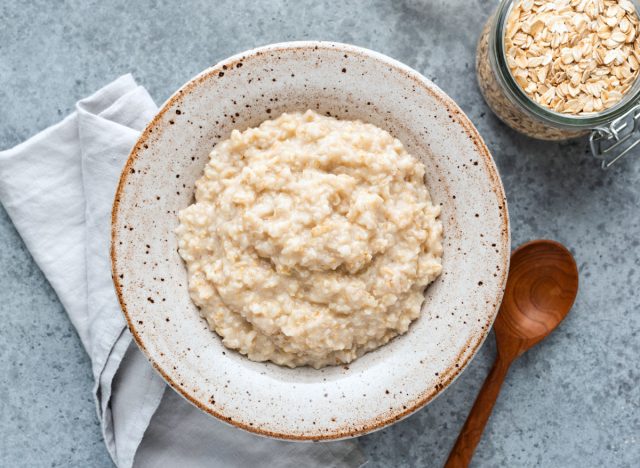
Oats are rich in beta-glucan, the powerful cholesterol-lowering agent also found in mushrooms. When consumed, beta-glucan forms a gel-like substance in the gut, binding to cholesterol-rich bile acids and preventing their absorption into the bloodstream. This process not only lowers levels of LDL (low-density lipoprotein) or "bad" cholesterol but also aids in overall digestive health. Including oats in your daily diet, therefore, can be a practical and natural way to manage cholesterol levels and reduce the risk of cardiovascular disease.
Studies have shown that, on average, oat consumption is associated with 5% and 7% reductions in total and LDL cholesterol levels, respectively.
Avocado
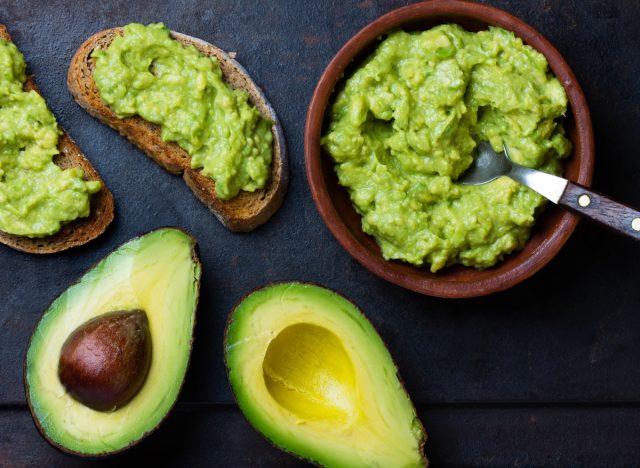
A must for guacamole and fish tacos, avocados are a popular fruit that helps give your diet a boost of healthy fats when they are included in your meals. In a clinical trial, participants who ate an avocado a day, as part of a moderate-fat diet, had reduced total cholesterol and bad LDL-cholesterol and improved the ratio of total cholesterol to good HDL-cholesterol levels, compared to participants who did not consume avocado (low-fat or moderate-fat oils diets). While the conclusions from a single study cannot be generalized to larger, more diverse populations, the study supports the growing body of evidence demonstrating avocados as a heart-healthy fruit.
In a different clinical study, 45 overweight or obese adults added one avocado a day to their low-fat and moderate-fat oil diets. By adding the avocado, researchers noted increased blood antioxidant levels and decreased the oxidation of small, dense LDL-cholesterol levels.
Garlic
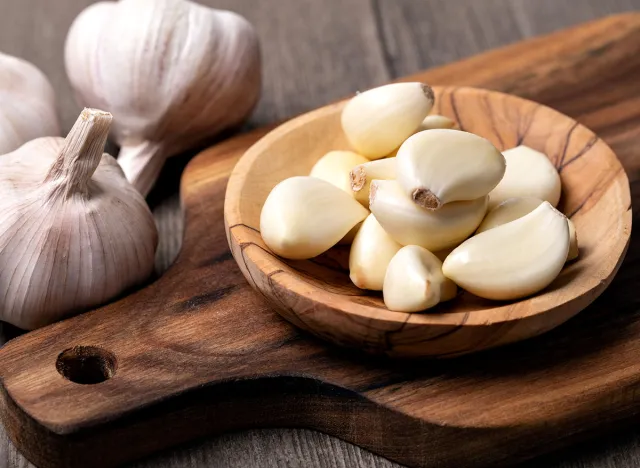
Garlic, with its little white cloves full of flavor, is not just a culinary treasure. Garlic has been traditionally celebrated for its health benefits, one of which is its potential to help lower cholesterol levels. Studies have indicated that garlic can modestly reduce cholesterol levels, which could be particularly beneficial for those aiming to manage their heart health. The active compounds in garlic, such as allicin, are thought to be responsible for these effects, providing a natural remedy for individuals looking to complement their heart-healthy lifestyle.
"According to a recent review, garlic has shown promise in reducing cholesterol levels," says Alyssa Simpson, RDN, CGN, CLT, owner of Nutrition Resolution in Phoenix, AZ. This is believed to be due to compounds in garlic that interfere with cholesterol production in the liver, particularly reducing LDL (bad) cholesterol.
Bamboo Shoots

Incorporating bamboo shoots into one's diet can be an effective strategy for managing cholesterol levels. These shoots are not only low in calories but also rich in dietary fiber, a crucial component for cardiovascular health. The fiber in bamboo shoots may bind with cholesterol in the digestive system, aiding in its excretion and thus helping in lowering overall cholesterol levels in the body.
"Traditionally a very important ingredient in Asian cuisines, bamboo shoots can be found in ramen and stir-fry dishes," Qianzhi Jiang, PhD, RDN, LDN, Founder of The Nutrition Changer, explains. "A recent study showed significantly lower cholesterol levels in mice fed bamboo shoots and beneficial effects on the bacteria composition in their gut. This is promising to treat many conditions including high cholesterol and obesity, Jiang adds. While we need more data based on human subjects, this is exciting news in the cholesterol world.
Margarine with Plant Stanols

Margarine with plant stanols is a type of spread designed to help lower cholesterol levels, making it a heart-healthy alternative to traditional butter or margarine. Plant stanols are natural substances extracted from plants that can block the absorption of cholesterol in the digestive system, potentially reducing total and LDL cholesterol levels when consumed as part of a balanced diet.
According to data published in Nutrients, taking in between 1.5 to 3 grams per day may lower LDL cholesterol by 7.5% to 12%.
Fatty Fish
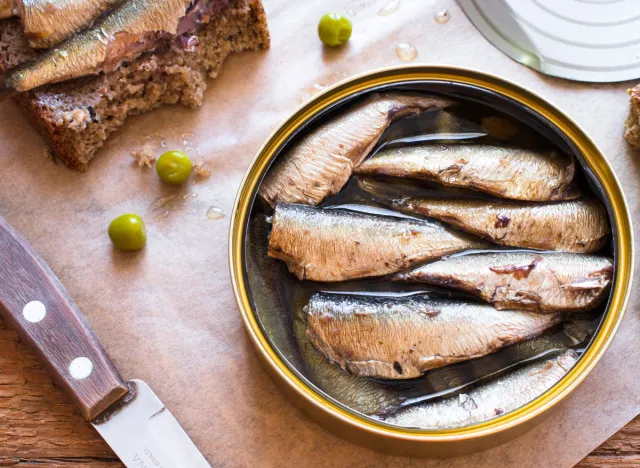
"Consuming omega-3 fatty acids from fatty fish like sardines and mackerel can have cholesterol-lowering properties due to the specific types of omega-3s they contain, namely EPA and DHA," Wan Na Chun, MPH, RD, CPT. Owner of One Pot Wellness based in Indianapolis, IN explains. "These fatty acids play a crucial role in reducing triglyceride levels in the bloodstream, which are a type of fat that can contribute to heart disease risk," she adds.
Omega-3 fatty acids have been shown to lower triglycerides by inhibiting the synthesis of very low-density lipoprotein (VLDL), a precursor to LDL cholesterol. Studies have demonstrated that regular consumption of fatty fish rich in omega-3s can lead to significant reductions in triglyceride levels, highlighting their beneficial impact on cholesterol profiles and overall cardiovascular health, she explains.
Barley
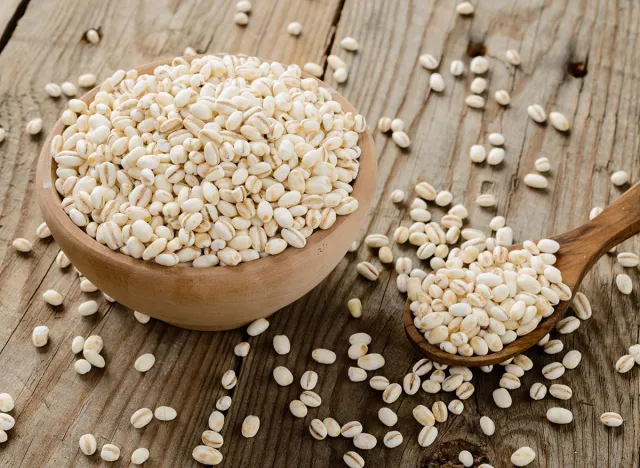
Barley is a versatile cereal grain with a rich, nutlike flavor and an appealing chewy, pasta-like consistency when cooked. Recognized as one of the oldest grains, dating back to ancient civilizations, barley is used in a variety of dishes, ranging from bread and soups to stews and salads. It's a significant source of dietary fiber, vitamins, and minerals, particularly beneficial for heart health, digestion, and for maintaining a balanced diet.
"The beta-glucan in barley is a type of soluble fiber that targets LDL," Lori McCall, MS, RD, LDN, a freelance plant-based writer based in Western NC, explains.
A 2009 review in Annals of Family Medicine showed significant decreases in LDL, as well as triglycerides and total cholesterol, after just a few weeks of consuming barley.
Apples
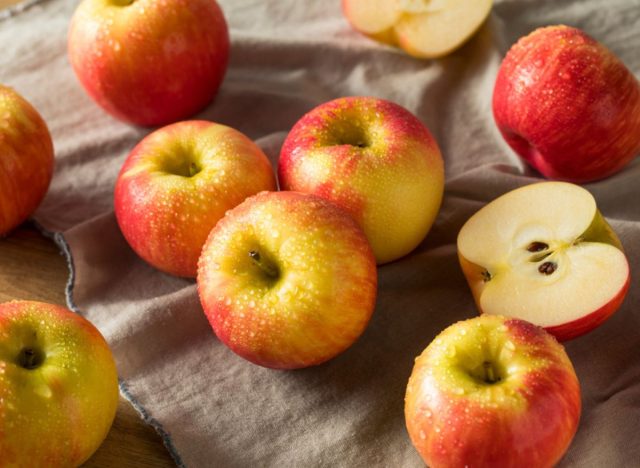
Apples are celebrated for their cholesterol-lowering abilities, primarily due to their high soluble fiber content. Soluble fiber interacts with the digestive process, binding with water and forming a gel-like substance that traps cholesterol and prevents its absorption in the bloodstream. Furthermore, apples contain polyphenols, which also play a role in promoting heart health by lowering blood pressure and reducing inflammation.
A study published in the American Journal of Clinical Nutrition showed that people who consumed two apples per day for eight weeks resulted in a reduction in LDL cholesterol.
Blueberries
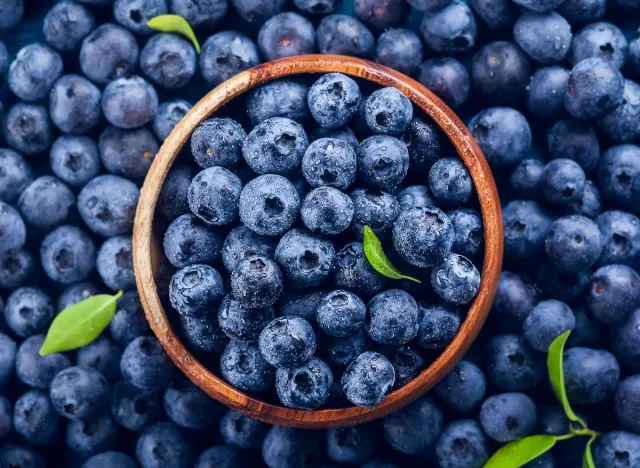
Blueberries are renowned as a food that lowers cholesterol levels, thanks to their high content of soluble fiber and antioxidants. The soluble fiber in blueberries helps reduce the amount of LDL cholesterol in the bloodstream. Furthermore, the potent antioxidants, particularly anthocyanins, which give blueberries their vibrant color, have been shown to prevent cholesterol from becoming oxidized and building up in the artery walls. This dual action makes blueberries an excellent dietary choice for promoting heart health and reducing cardiovascular risk.
A 2016 meta-analysis evaluating 22 studies showed that berries consumption significantly lowered the low-density lipoprotein (LDL)-cholesterol as well as other factors like Hemoglobin A1c (HbA1c).
- Source: High Cholesterol Facts | CdC.gov. (2023, May 15). Centers for Disease Control and Prevention. https://www.cdc.gov/cholesterol/facts.htm
- Source: Agarwal, S., & Fulgoni, V. L., 3rd (2023). Effect of Adding Pulses to Replace Protein Foods and Refined Grains in Healthy Dietary Patterns. Nutrients, 15(20), 4355. https://doi.org/10.3390/nu15204355
- Source: How does Plant-Forward (Plant-Based) Eating Benefit Your Health? (2023, December 20). www.heart.org. https://www.heart.org/en/healthy-living/healthy-eating/eat-smart/nutrition-basics/how-does-plant-forward-eating-benefit-your-health
- Source: Cerletti, C., Esposito, S., & Iacoviello, L. (2021). Edible Mushrooms and Beta-Glucans: Impact on Human Health. Nutrients, 13(7), 2195. https://doi.org/10.3390/nu13072195
- Source: Krittanawong, C., Isath, A., Hahn, J., Wang, Z., Fogg, S. E., Bandyopadhyay, D., Jneid, H., Virani, S. S., & Tang, W. H. W. (2021). Mushroom Consumption and Cardiovascular Health: A Systematic Review. The American journal of medicine, 134(5), 637–642.e2. https://doi.org/10.1016/j.amjmed.2020.10.035
- Source: Jones, J. L., Sabaté, J., Heskey, C., Oda, K., Miles, F., & Rajaram, S. (2023). Macadamia nut effects on cardiometabolic risk factors: a randomised trial. Journal of nutritional science, 12, e55. https://doi.org/10.1017/jns.2023.39
- Source: Smith, B. J., Hatter, B., Washburn, K., Graef-Downard, J., Ojo, B. A., El-Rassi, G. D., Cichewicz, R. H., Payton, M., & Lucas, E. A. (2022). Dried Plum's Polyphenolic Compounds and Carbohydrates Contribute to Its Osteoprotective Effects and Exhibit Prebiotic Activity in Estrogen Deficient C57BL/6 Mice. Nutrients, 14(9), 1685. https://doi.org/10.3390/nu14091685
- Source: Othman, R. A., Moghadasian, M. H., & Jones, P. J. (2011). Cholesterol-lowering effects of oat β-glucan. Nutrition reviews, 69(6), 299–309. https://doi.org/10.1111/j.1753-4887.2011.00401.x
- Source: Wang, L., Bordi, P. L., Fleming, J. A., Hill, A. M., & Kris-Etherton, P. M. (2015). Effect of a moderate fat diet with and without avocados on lipoprotein particle number, size and subclasses in overweight and obese adults: a randomized, controlled trial. Journal of the American Heart Association, 4(1), e001355. https://doi.org/10.1161/JAHA.114.001355
- Source: Wang, L., Tao, L., Hao, L., Stanley, T. H., Huang, K. H., Lambert, J. D., & Kris-Etherton, P. M. (2020). A Moderate-Fat Diet with One Avocado per Day Increases Plasma Antioxidants and Decreases the Oxidation of Small, Dense LDL in Adults with Overweight and Obesity: A Randomized Controlled Trial. The Journal of nutrition, 150(2), 276–284. https://doi.org/10.1093/jn/nxz231
- Source: Gyawali, D., Vohra, R., Orme-Johnson, D., Ramaratnam, S., & Schneider, R. H. (2021). A Systematic Review and Meta-Analysis of Ayurvedic Herbal Preparations for Hypercholesterolemia. Medicina (Kaunas, Lithuania), 57(6), 546. https://doi.org/10.3390/medicina57060546
- Source: Zhou, X., Pak, S., Li, D., Dong, L., Chen, F., Hu, X., & Ma, L. (2023). Bamboo Shoots Modulate Gut Microbiota, Eliminate Obesity in High-Fat-Diet-Fed Mice and Improve Lipid Metabolism. Foods (Basel, Switzerland), 12(7), 1380. https://doi.org/10.3390/foods12071380
- Source: Trautwein, E. A., Vermeer, M. A., Hiemstra, H., & Ras, R. T. (2018). LDL-Cholesterol Lowering of Plant Sterols and Stanols-Which Factors Influence Their Efficacy?. Nutrients, 10(9), 1262. https://doi.org/10.3390/nu10091262
- Source: Yanai, H., Masui, Y., Katsuyama, H., Adachi, H., Kawaguchi, A., Hakoshima, M., Waragai, Y., Harigae, T., & Sako, A. (2018). An Improvement of Cardiovascular Risk Factors by Omega-3 Polyunsaturated Fatty Acids. Journal of clinical medicine research, 10(4), 281–289. https://doi.org/10.14740/jocmr3362w
- Source: Talati, R., Baker, W. L., Pabilonia, M. S., White, C. M., & Coleman, C. I. (2009). The effects of barley-derived soluble fiber on serum lipids. Annals of family medicine, 7(2), 157–163. https://doi.org/10.1370/afm.917
- Source: Koutsos, A., Riccadonna, S., Ulaszewska, M. M., Franceschi, P., Trošt, K., Galvin, A., Braune, T., Fava, F., Perenzoni, D., Mattivi, F., Tuohy, K. M., & Lovegrove, J. A. (2020). Two apples a day lower serum cholesterol and improve cardiometabolic biomarkers in mildly hypercholesterolemic adults: a randomized, controlled, crossover trial. The American journal of clinical nutrition, 111(2), 307–318. https://doi.org/10.1093/ajcn/nqz282
- Source: Huang, H., Chen, G., Liao, D., Zhu, Y., & Xue, X. (2016). Effects of Berries Consumption on Cardiovascular Risk Factors: A Meta-analysis with Trial Sequential Analysis of Randomized Controlled Trials. Scientific reports, 6, 23625. https://doi.org/10.1038/srep23625


